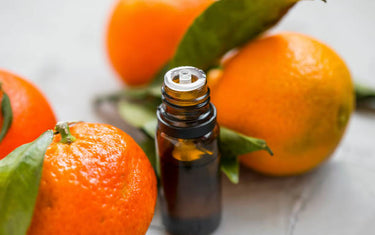6 min read / 3 December 2021 / Laura Garvin Gomez
Benefits and Uses of Juniper Berry Oil
This famous gin ingredient has strong cleansing and purifying properties.

Famous for flavouring gin, juniper berries are so much more than a fragrant ingredient.
Recorded in medical texts for centuries, the juniper berry has a huge number of medicinal properties that are still used in aromatherapy today.
In fact, these uses are so commonplace that many herbalists and historians find it hard to pin down exactly where in the world juniper berries first originated from, as by the time of the Ancient Egyptians, their use was already global.
What is Juniper Berry Essential Oil?Sometimes compared to its lesser-known family member cade, juniper essential oil (Juniperus communis) is a sweet and woody oil with light herbal top notes and a well-rounded aroma. The juniper shrub itself is known to grow wild throughout central Europe, and its berries are harvested for numerous purposes including the production of gin, where the essential oil is normally extracted as a by-product. The berries are commonly either crushed, dried, or partially dried, and then steam distilled to produce the pale yellow essential oil. |
What are the benefits of Juniper Berry Essential Oil?
Though the plant and the oil have been used in medicinal practices for centuries, there is still much to be uncovered about what the juniper berry can do for our health and wellness.
Some of the most well-researched juniper berry essential oil benefits include:
- Promotion of healthy urination
- Improvements in digestive health
- Facilitating sleep and relaxation
- Natural antiseptic properties for skin and hair

Can Juniper berry essential oil promote healthy urination?
Like some other essential oils, Juniper berry oil is a natural diuretic.
This means that it can promote urination and does so by allowing excess fluid to be expelled from the bladder and urethra.
The process of frequent urination then contributes to the detoxification of the body, allowing for a healthier immune system as well as the reduction of uncomfortable bloating.
Not only that, but research has shown that juniper berry oil has both antibacterial and antifungal properties that can further contribute to wellness in this area.
Juniper berry has become a popular choice for the prevention and treatment of urinary tract infections and bladder infections, as it acts as a natural agent against the responsible bacteria, whilst also encouraging the bladder to flush them out.
Does juniper berry oil aid digestive health?
It has been suggested that juniper berry oil can help to stimulate digestive enzymes and aid the process of digestion.
This is because it is a ‘bitter’. Bitters are herbs that are said to begin the digestive process in the body.
An animal study in 2007 showed that giving juniper berry oil to cows could significantly improve their digestion, however further research on this effect in humans is still ongoing.
Applying diluted juniper oil topically to the abdomen can help possibly help to promote these digestive effects and can also aid antioxidation in the body.
Juniper oil has been found to help increase the activity of three important antioxidants: catalase, superoxide dismutase (SOD), and glutathione peroxidase.
All three of these antioxidants have huge benefits, helping to reduce cell damage by fighting free radicals and toxins, which in turn help to guard the body against serious diseases.

Will juniper berry essential oil help me sleep?
Diffusing juniper berry oil in your bedroom can be a great way to naturally combat issues surrounding sleep.
Folklore has long considered the juniper berry to be a natural anxiety remedy, and it has also been shown that juniper berry can incite a state of relaxation and aid sleep.
A study in 2006 showed that insomniacs were able to take less sleep-promoting medication when inhaling an essential oil containing juniper berry, as the oil contributed to the sensation of needing to sleep.
The effects were so powerful, in fact, that twelve subjects were able to use the essential oil to eliminate medication altogether.
Is juniper berry oil a natural antiseptic?
As mentioned previously, juniper berry oil has strong antimicrobial properties that can help it to kill bacteria and fight infections.
These properties aren’t mild – a study in 2003 even suggested that juniper oil could be effective against bacteria that are resistant to antibiotics.
Juniper oil has also been found to be effective against fungi such as candida.
These strong cleansing properties make juniper oil a popular ingredient in home cleaning sprays, and also make it suitable for cleansing skin when diluted.
It can serve as a natural remedy against acne, as well as an alternative for fighting skin irritations such as rashes and eczema.
Some people also utilise these properties in their haircare routines to fight against dandruff and when combined with rosemary oil for hair can significantly improve hair growth and hair health.

How to use Juniper Berry Essential Oil
1. Aromatherapy
Much like the scent of gin, the refreshing and lightly sweet notes of juniper berry provide an ideal backdrop for lovers of all things herbaceous.
Add a few drops to your diffuser or oil burner to enjoy this scent around your home or try inhaling some before bed to promote a more regular sleep pattern through the night.
2. Massage
If you’re suffering from bloating or issues in your urinary tract, a restorative massage using juniper berry essential oil and a light carrier oil can help realign these systems.
This mixture could also help to stimulate your digestive system.
3. Skincare
Juniper berry oil is filled with antioxidants that can enrich and nourish the skin.
Try combining a few drops with a carrier oil and applying it to your face as a daily cleanser to help brighten up your complexion.
Alternatively, you could also try using juniper berry to spot treat areas that are prone to acne or irritations, as the oil’s antimicrobial properties can help to successfully clean up the skin.
4. Haircare
Some sources suggest that applying juniper berry oil to your shampoo or conditioner can help to prevent dandruff as well as improve overall health in the scalp area.
What is the history of Juniper Berry Essential Oil?
Once seen as a protective force against evil spirits and negative forces, the juniper berry was renowned throughout history for its protective properties.
It was used by the Zuni Indians to assist in childbirth, by the Medieval English to protect physical and emotional health, and by the Ancient Greeks to combat epidemics, among other applications.
The ancient Romans also believed that the juniper berry could be effective against stomach and chest pains, as well as common coughs and colds.
Across a number of indigenous societies as well as in the Middle Ages, juniper berry was burned and used to cleanse and purify the air.

An ancient remedy with an extensive resume, juniper berry is one of the major players in aromatherapy, and a useful addition to any medicine cabinet.
Its purifying, earthy scent soothes and relaxes, deceptively calm, as the oil itself wages war on harmful bacteria.
|
Product Name |
100% Pure Juniper Berry Essential Oil |
| Botanical Name | Juniperus Communis |
| Scent Type | Earthy |
| Benefits & Uses | Aids Digestion, Cleaning Agent, Relaxing |
| Suitable for Diffusers? | Yes, this juniper berry essential oil is perfect for diffusers. |
| Suitable for Candles and Soaps? | Yes, this juniper berry essential oil is perfect for candle and soap making. |
| Extraction Method | Steam Distillation |
| Bottle Type | Tamper proof and UV resistant |









